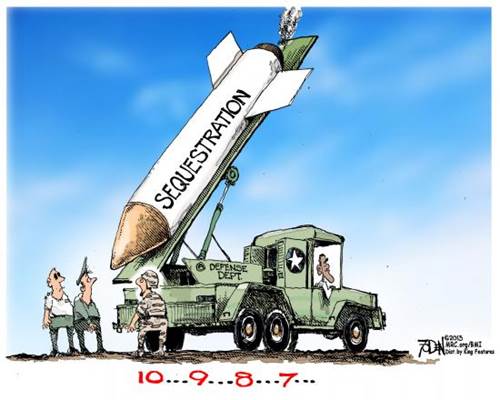The dreaded sequestration is upon us! The world is ending! Run away! — and Markets scream higher.
Something appears to be wrong with this picture — and this morning, we are going to discuss which of these two organizations is incorrect.
Let’s begin by noting both of these entities are self organizing collections of humans. Irrationality is built into their essence. We cannot get away from that factor, at least not until the singularity arrives, and humans can have their irrationality (and humanity) programmed out of them. For now, let’s simply admit that this is an inherent function of the breed. It cannot be avoided in organizations of Humans.
Second, consider the motivations (to anthropomorphize this) of each entity. There in lay the clues as to which is more or less rational.
Markets exist as a place where capital, investors and investments intersect in the form of securities. It is where the buying and selling of debt and equity occurs. Those with capital can invest in or lend to those who can put it to better potential long-term use, be they start ups or existing companies or governments.
Media is a business form that creates content, which then attracts an audience. Media then monetizes that primarily by selling access to this audience to its advertisers.
Neither of these entities is any stranger to irrationality. While noth have a profit motive, they each go about pursuing it in very different ways.
At Market tops and bottoms, the collective pricing of its wares becomes absurd. In 1982, stocks traded at an 8 P/E. In 2000, they traded at 32 P/E. On the eve of crisis in October 2007, stocks were priced as if all was fine. In March 2009, stocks were priced as if governments and the Federal Reserve were going to do nothing. History teaches us that the human elements of markets all too regularly spiral into spasms of mass delusion.
Media has a somewhat differing approach to embracing irrationality — with a different level of background foolishness. Hype is the watchword, and the media can take a relatively modest issue and blow it up far beyond reasonable proportions. Think back to Y2K as an example of relentless media silliness and fear mongering. The world was going to come to a stop on December 31st, 1999 when the clocks rolled over. (Nothing happened). This past December, the Fiscal Cliff was going to be yet another disaster. Again, you should have ignored the hype.
And now, we have the sequester. It is front page story, lead item on every TV show. Yes, Sequester is likely to shave at least 0.5% off of our total GDP. It reflects the congenital dysfunction in Washington, DC. I don’t want to suggest this is a good thing — it is, as the comic below suggests, a self-inflicted wound. But it is not all that much of a stretch to read the actions of the market as suggesting its not all that.
With Markets, the irrational behavior is a bug. Smarter, more experienced investors are aware of this all-too-human behavior. It creates opportunities, but is wildly disruptive. When markets become irrational, a majority of its participants suffer. Entire schools of thought have arisen to study irrational behavior of financial actors (i.e., Behavioral Economics and Neurofinance). It is not considered an advantage when markets spiral into their regular fits of irrationality.
With Media, irrational behavior is a feature, not a bug. The goal is to attract a large audience that can be monetized with adverts. Hence, there is an incentive to emphasize the outrageous, the ridiculous, to create buzz and hype. An entire subspecialty dedicated to studying memes and viral events has arisen to capitalize on this. It is considered an advantage when media spirals into their regular fits of hype. From a business perspective, “Irrationality” to organizations that sell audiences to advertisers, is quite a rational behavior.
Washington D.C. is the perfect foil for Media. It creates a a false narrative that plays right into their sweet spot. There are the classic elements of narrative conflict: Great stakes, villains and heroes, dramatic personalities, risk and redemption. As previously discussed, the media narrative about the 2012 presidential election — the horse race that was too close to call — was wildly wrong. But it sold boatloads of papers and advertising.
It also scared some people into them into some poorly considered decisions. Over the years, I have tried to emphasize how dangerous a compelling narrative can be to investors. This is where the media narrative becomes so dangerous.
I don’t want to suggest either is monolithic. Markets consist of buyers and sellers. Media has a spectrum of opinions. Markets produce an investment opinion by the preponderance of actions of its participants. Some press practitioners actually got these things right, and were proven by time to possess insight. But what we are referring to here is the overall actions, the collective impressions each creates.
Between the two entities, which are you more likely to believe — the one whose job it is to match buyers and sellers, or the one who is trying to deliver an audience to advertisers?



What's been said:
Discussions found on the web: